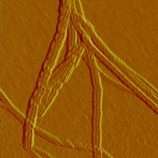Interdisciplinary team awarded £600,000 to help understand the diseases of old age

Schools of Physics and Chemistry combine to investigate the processes underlying conditions such as diabetes and cataracts.
The Biotechnology and Biological Sciences Research Council (BBSRC) has awarded £600,000 to an interdisciplinary collaboration between the School of Chemistry and the School of Physics and Astronomy.
The project, entitled “Biophysical dissection of protein nucleation using a combined experimental and computational approach”, will support research into the processes that drive diseases of ageing such as cataract and type-II diabetes.
It will employ close collaboration between experiment and simulation to better understand the earliest events in protein self-assembly at the single molecule level.
The normal self-assembly of proteins into structures containing many molecules is responsible for many biological functions and is essential to our well-being. Occasionally, due to a mutation or a change in environment, protein self-assembly takes place inappropriately. Small changes in very few molecules are sufficient to trigger “runaway” self-assembly. It is these changes, the triggering events, that are the focus for investigation.
Dr Cait MacPhee of the Institute for Condensed Matter and Complex Systems said: “Solving big problems needs a multidisciplinary approach. We’re applying the tools of physics and chemistry to an important biological phenomenon.
“Protein self-assembly doesn’t just cause disease, it also offers us the potential for new materials, new foodstuffs and new medicines. But to exploit it or prevent it we need to control it, and to control it we need to understand the earliest steps, molecule by molecule.”
The project takes advantage of an existing research programme with IBM, and a new multidisciplinary collaboration with the University of Oxford and the National Physical Laboratory in London. It will be led by the School’s Dr Cait MacPhee and Prof Jason Crain, and the School of Chemistry’s Dr Perdita Barran. Research techniques will include ion mobility mass spectrometry, spectroscopic methods and advanced computer simulations.
The award is part of the Research Councils UK “Lifelong health and wellbeing” programme. This cross-council strategic priority reflects the unprecedented demographic change underway in the UK. The proportion of young people is declining whilst that of older people is increasing. The Councils recognise that there are considerable benefits to the UK of having an active and healthy older population with potential economic, social, and health gains associated with healthy ageing and reducing dependency in later life.
The project is part of a wider pan-Scotland SUPA initiative in the area of Physics and Life Sciences (PALS). PALS has been identified by SUPA as the major opportunity for growth in physics research in Scotland, and this is reflected by the recent establishment of £10 million research theme across the eight SUPA universities. Dr Cait MacPhee currently acts as PALS Theme Leader.

